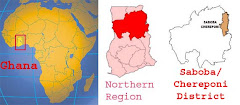The numbering has no relevance for preference. Simply the order I wrote the post in.
Solidarity among rural communities. Communal labour is an initiative that I admire about Buagbaln village. Communal labour is the reinforcement call when you have too much work to do on your own. If a farmer is ploughing their field and cannot complete it on their own, they can call for communal labour. “Children” aged 15-24 will answer the call and report to whatever the task is after they get back from school at 2pm. My host brother Philip (23) is always reporting to communal labour.
Apart form the example I gave of tilling your field, others could be construction of a house. As most huts here are made from mud bricks and mud mortar, it involves an immense amount work. Mixing dry mud with water to make mortar is extremely tiring (I’ve tried), which needs to be done to mould bricks, and for the mortar for the hut. A common call for communal labour is exactly this task, mixing of mortar and constructing the walls.
One that my family recently used was that they were re-flooring their entire compound courtyard. This involved breaking up the old concrete with pick ax, followed by laying new gravel, and concrete, and ending with compacting. For a family to do this entire task on their own would take too long for one day, which is the time frame it needs to be done in.
Another communal initiative are grain banks which I have seen in certain communities. Essentially a large community food storage is built by all members of the community, and upon harvest everyone donates a portion of their crops to this bank. It serves as a safety net for the community when shocks occur to individuals or the entire community. Should someone lose their entire harvest to pests, or perhaps fire, the grain bank would serve to pick that person up. It is also used to supplement the community food intake during the lean season (see blog post Back to the Field)
I don’t quite understand how, but it works on the honour system, and apparently nobody abuses it. The reason why I love these initiatives is because all the farmers are in the same situation and recognize the need for cooperation. There are conditions about their lives that make certain tasks too great for an individual to do on their own. Seeing this type of communal solidarity in overcoming the difficulties surviving off the land can throw at you, makes me wonder if something was lost when civilizations progressed to big cities and lost their connection with the land they depend on for survival. Nonetheless, I admire the sense of brotherhood that joins this community together.


